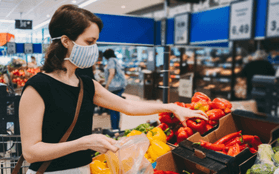Protecting the health and well-being of your volunteers
Share the latest information from trusted authorities:
- Use all your communication channels to provide clear information from Queensland Health. Share posters and emails to promote hand hygiene and respiratory etiquette.
Promote social distance:
- Encourage staff to keep a social distance of 1.5 metres from one another. Promote handshake free meetings.
Set strict expectations on unwell staff:
- Communicate clearly the need for all unwell staff to stay at home. If a team member who is unwell comes into the office, ensure that they go home immediately and seek medical attention if needed.
Offer handwashing facilities:
- Handwashing facilities should be available and well supplied. Provide soap, hand sanitiser, tissues and cleaning products around your buildings for staff, volunteers, clients and visitors. Queensland Health has published clear and printable instructions on handwashing techniques which can be displayed around your workplace.
Schedule cleaning regimes:
- Frequently clean key areas including keyboards, desks and door handles.
Support staff working from home:
- Staff and volunteers may be required to work from home, particularly due to school closures. Consideration should be given to the infrastructure, equipment and processes needed to allow staff to work remotely. These could include secure, remote access to your files, video conferencing and telephone facilities and guidance on working from home safely.
Protect vulnerable groups:
- Recommend time off for vulnerable volunteers and those who are understandably concerned about their health. Make sure you protect those who are at risk: People in aged care facilities; People with chronic illnesses or who are immune-compromised; People who are homeless; Victims of family or domestic violence; and, those with disabilities.
Keep up to date with the latest restrictions for events or gatherings :
- View the Queensland Government’s roadmap to easing restrictions for the latest information.
Hold meetings via video or tele conferencing:
- Utilise video or tele conferencing for internal and external meetings, including board and committee meetings.
Review travel risks and arrangements:
- Staff and volunteers should avoid travelling at this time due to overseas and domestic travel restrictions.
Look after mental health:
- Support volunteers to look after their mental wellbeing. Remind them to take time to switch off from all things COVID-19 and focus on things they can control.
Record key contacts:
- Ensure all emergency contact details are up to date.
Be prepared at home:
- Recommend volunteers have two weeks’ supply of food and medication on hand for all residents and pets. Encourage being prepared, discourage panic buying.
Keep volunteers informed:
- Communication is key. Let them know about any changes that affect them, so they don’t worry. Check in often.
Adapted from information provided by NCVO and Queensland Health.






